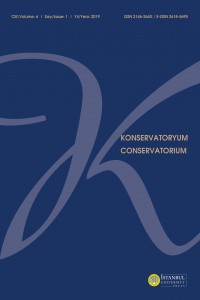Research Article
Year 2019,
Volume: 6 Issue: 1, 91 - 103, 28.06.2019
Abstract
Memorization plays an important role for performers in developing their ideas about execution more freely and sharing these ideas with listeners more effectively. Therefore, the acquisition of memory techniques is a necessary fact for performers. Types of memory and the process of memorization of music by learning for the acquisition of a safe memory of music have been researched. The memorization process consists of four components: Visual (photographic), acoustic, motor (kinetic/fingers) and analytic (intellectual). When these four components are used together during the study, a lasting and safe memory skill is acquired. The process of memorization consists of four steps: Perception, placement (internalization) protection, and recollection. A process of memorization where these steps are completed in full helps the memory to be created without any mistake. Also, the relationship between memorization and anxiety is also examined. When the components that factor in safe memorization are used together, the performance anxiety can be decreased, even eradicated. The artist can deliver a flawless performance with increased self-confidence. In this article suggestions such as analysis towards the improvement of memorization, memory study with increasing the amount from cellular to large section, cognitive study and notation are presented with the help of information presented above.
References
- Aiello, R. ve Williamon, A. (2002). Memory. In Parncut, R. ve McPherson, G. E. (Eds.), The Science and Psychology of Music Performance (pp. 167-179). New York, USA: Oxford University Press.
- Gün Duru, E. ve Köse, H.S. (2016a). Keman eğitiminde ezber yöntemine dayalı bir öğretim programı önerisi. İdil Dergisi, 5(24), 1163-1182.
- Gün Duru, E. ve Köse, H.S. (2016b). Müziksel ezber üzerine nitel bir çalışma. The Journal of Academic Social Science Studies, 43, 121-131.
- Kabakçı, C. (2016). Sahne performansı kaygısında farkındalık ve mücadele. Sahne ve Müzik Eğitim-Araştırma e-Dergisi, 3, 86-96.
- Klickstein G. (2009). The musician’s way: A guide to practice, performance, and wellness. New York, NY: Oxford University Press.
- Mather, M. (2006). Why memories may become more positive as people age. In B. Uttl, N. Ohta, & A. L. Siegenthaler (Eds.), Memory and emotion: Interdisciplinary perspectives, New York: Blackwell, pp. 135-159.
- Palancı, M., Altun Dinç, Z. ve Doğan, U. (2015). Üniversite öğrencilerine yönelik müzik performans kaygısı ölçeğinin uyarlama çalışması. Uşak Üniversitesi Sosyal Bilimler Dergisi, 8(2), 155-165.
- Sandor, G. (1981). Memorization. On Piano Playing: Motion, Sound and Expression (pp. 192-197). New York, NY: A Division of Macmillan Publishing Co., Inc.
- Topoğlu, O. (2013). Müzisyenlerde sahne korkusu, sahne korkusunun nedenleri ve sahne korkusuyla baş etmede kullanılabilecek stratejiler. e-Journal of New World Sciences Academy 8(1), 43-55.
- Tufan, A. (2017, Nisan 22). Bilgiyi işleme kuramı ve bellek türleri. Güncel Psikoloji. Erişim adresi: https://www.guncelpsikoloji.net
- Yeşilyaprak, B. (2003). Gelişim ve öğrenme psikolojisi. Ankara: Pegema Yayıncılık.
Year 2019,
Volume: 6 Issue: 1, 91 - 103, 28.06.2019
Abstract
Müzik icrasında ezber çalma önemli bir yere sahiptir. Yorumcular, eğitim aşamasından itibaren kariyerlerinde ezber çalmak zorunda kalmaktadırlar. Ezber, icracıların yorum ile ilgili fikirlerini özgürce geliştirerek dinleyici ile daha etkin paylaşımlar içinde olmalarında önemli bir rol oynar. Bu nedenle ezberleme tekniklerinin edinilmesi icracılar için gereklidir. Literatür taraması yoluyla edinilen bulgularla oluşturulan bu makalede güvenli bir ezberin oluşması için gerekli olan müziğin hafızaya alınma süreci ve hafıza çeşitleri incelenmiştir. Ezber sürecinde görsel (fotoğrafik), işitsel (akustik), motor (kinetik/parmak) ve analitik (entelektüel) hafıza olarak dört bileşen bulunmaktadır. Bu dört unsurun birlikte kullanılarak yapıldığı çalışmalarda kalıcı ve güvenli bir ezber becerisi kazanılır. Ezber süreci, algılama, yerleştirme (içselleştirme) koruma ve hatırlama adımlarından oluşur. Bu aşamaların eksiksiz bir şekilde tamamlandığı bir ezberleme süreci, ezberin hatasız olarak gerçekleşmesine katkıda bulunur. Makalede ezber ve kaygı ilişkisi de irdelenmiştir. Etkin olan unsurlar bir arada kullanıldığında, güvenli bir ezber oluşur. Bunun sonucunda performans kaygısı azaltılabilir, hatta tamamen ortadan kalkabilir. Kendine güveni artan sanatçı kusursuz bir yorumu gerçekleştirebilir. Bu bilgilerin ışığında ezberi geliştirmeye yönelik analiz yapılması, hücreden büyük bölüme geçerek ezber çalışması, zihinsel çalışma ve nota yazımı gibi öneriler sunulmuştur.
Keywords
References
- Aiello, R. ve Williamon, A. (2002). Memory. In Parncut, R. ve McPherson, G. E. (Eds.), The Science and Psychology of Music Performance (pp. 167-179). New York, USA: Oxford University Press.
- Gün Duru, E. ve Köse, H.S. (2016a). Keman eğitiminde ezber yöntemine dayalı bir öğretim programı önerisi. İdil Dergisi, 5(24), 1163-1182.
- Gün Duru, E. ve Köse, H.S. (2016b). Müziksel ezber üzerine nitel bir çalışma. The Journal of Academic Social Science Studies, 43, 121-131.
- Kabakçı, C. (2016). Sahne performansı kaygısında farkındalık ve mücadele. Sahne ve Müzik Eğitim-Araştırma e-Dergisi, 3, 86-96.
- Klickstein G. (2009). The musician’s way: A guide to practice, performance, and wellness. New York, NY: Oxford University Press.
- Mather, M. (2006). Why memories may become more positive as people age. In B. Uttl, N. Ohta, & A. L. Siegenthaler (Eds.), Memory and emotion: Interdisciplinary perspectives, New York: Blackwell, pp. 135-159.
- Palancı, M., Altun Dinç, Z. ve Doğan, U. (2015). Üniversite öğrencilerine yönelik müzik performans kaygısı ölçeğinin uyarlama çalışması. Uşak Üniversitesi Sosyal Bilimler Dergisi, 8(2), 155-165.
- Sandor, G. (1981). Memorization. On Piano Playing: Motion, Sound and Expression (pp. 192-197). New York, NY: A Division of Macmillan Publishing Co., Inc.
- Topoğlu, O. (2013). Müzisyenlerde sahne korkusu, sahne korkusunun nedenleri ve sahne korkusuyla baş etmede kullanılabilecek stratejiler. e-Journal of New World Sciences Academy 8(1), 43-55.
- Tufan, A. (2017, Nisan 22). Bilgiyi işleme kuramı ve bellek türleri. Güncel Psikoloji. Erişim adresi: https://www.guncelpsikoloji.net
- Yeşilyaprak, B. (2003). Gelişim ve öğrenme psikolojisi. Ankara: Pegema Yayıncılık.
There are 11 citations in total.
Details
| Primary Language | Turkish |
|---|---|
| Journal Section | Research Article |
| Authors | |
| Publication Date | June 28, 2019 |
| Submission Date | March 13, 2019 |
| Published in Issue | Year 2019 Volume: 6 Issue: 1 |


